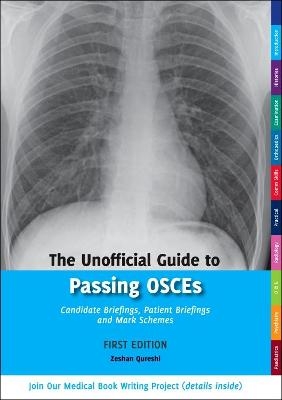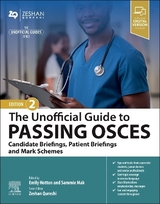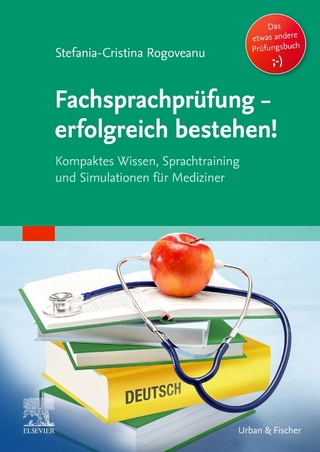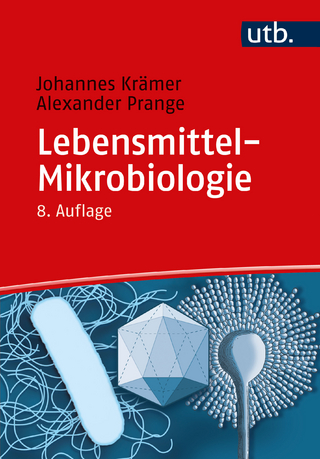
The Unofficial Guide to Passing OSCEs: Candidate Briefings, Patient Briefings and Mark Schemes
Zeshan Qureshi (Verlag)
978-0-9571499-2-2 (ISBN)
- Titel erscheint in neuer Auflage
- Artikel merken
This book is the companion book to 'The Unofficial Guide to Passing OSCEs'. OSCE examinations are used worldwide as a critical part of medical student assessment, yet there is often little preparation for them provided by medical schools. The Unofficial Guide to Passing OSCEs is intended to fill this gap. It includes 92 scenarios, covering medical history taking, clinical examination, practical skills, communication skills, plus specialties, meaning that everything for medical students is covered in one place. The book is designed to allow students to role play a real life OSCE, with each station containing a) a briefing for an actor playing 'the patient' b) a briefing for the 'student' and c) a mark scheme and questions to ask for 'the examiner'. This book has relevance beyond examinations, with the mark scheme checklists acting as a day-to-day reference for professionals.
Zeshan Qureshi is a Paediatrician based at Great Ormond Street and the Institute of Child Health. He graduated with distinction from the university of Southampton, and has published and presented research work extensively and internationally in the fields of pharmacology and medical education. Whilst working in Edinburgh he was part of the leadership team developing a near peer teaching programme, where by junior doctors, throughout south east scotland, were both trained to teach, and delivered teaching across every hospital in the area. This book is an extension of this philosophy: that junior doctors and fresh graduates know how to express complex ideas in order for it to be easily understood from a students perspective. That junior doctors can teach, and write in a complimentary way to senior doctors: one that is friendly and fun, easy to read and relevant to both exams, and the day to day to life of junior doctors.
Chapter 1: History Taking (1.1 Cardiovascular History: Chest Pain, 1.2 Respiratory History: Productive Cough, 1.3 Gastrointestinal History: Abdominal Pain, 1.4 Gastrointestinal History: Diarrhoea, 1.5 Neurological History: Headache, 1.6 Vascular History: Intermittent Claudication, 1.7 Orthopaedic History: Back Pain, 1.8 Haematology History, 1.9 Breast History, 1.10 Genitourinary Medicine: Sexual History) Chapter 2: Clinical Examination (2.1 Cardiovascular Examination, 2.2 Respiratory Examination, 2.3 Cranial Nerves Examination, 2.4 Upper Limb Neurological Examination, 2.5 Lower Limb Neurological Examination, 2.6 Cerebellar Examination, 2.7 Parkinson's Examination, 2.8 Gastrointestinal Examination, 2.9 Hernia Examination, 2.10 Testicular Examination, 2.11 Stoma Examination, 2.12 Rectal Examination, 2.13 Peripheral Arterial Examination, 2.14 Varicose Veins Examination, 2.15 Ulcer Examination, 2.16 Neck Lumps Examination, 2.17 Breast Examination, 2.18 Dermatology Examination, 2.19 Cushing's Syndrome Examination, 2.20 Acromegaly Examination, 2.21 Thyroid Examination, 2.22 Haematology Examination, 2.23 Eye Examination, 2.24 Ear Examination, 2.25 Newborn Baby Examination, Chapter 3: Orthopaedic Examinations (3.1 Thoraco-Lumbar Spine Examination 3.2 Cervical Spine Examination 3.3 Hand Examination 3.4 Shoulder Examination 3.5 Hip Examination 3.6 Knee Examination 3.7 Gait, Arms, Legs and Spine (GALS) Screening) Chapter 4: Communication Skills (4.1 Consent for Endoscopy 4.2 Consent for HIV Testing 4.3 Autopsy Consent 4.4 Consent for Hernia Repair 4.5 Blood Transfusion 4.6 Warfarin Counselling 4.7 Opiate Counselling 4.8 Lifestyle Advice Post Myocardial Infarction 4.9 Dealing with an Agitated Patient 4.10 Breaking Bad News) Chapter 5: Practical Skills (5.1 Intermediate Life Support, 5.2 Phlebotomy, 5.3 Intravenous Cannulation/Setting Up a Giving Set, 5.4 Male Urethral Catheterisation, 5.5 Urinalysis, 5.6 ECG Interpretation, 5.7 Fundoscopy, 5.8 Death Certification, 5.9 Instruments, 5.10 Suturing) Chapter 6. Radiology (6.1 Chest X-ray, 6.2 Abdominal X-ray, 6.3 Orthopaedic X-ray) Chapter 7: Obstetrics and Gynaecology(7.1 Placenta Praevia, 7.2 Breech Presentation, 7.3 Consent for Caesarean Section, 7.4 Antepartum Haemorrhage, 7.5 Obstetric Examination, 7.6 Anxious Pregnant Woman, 7.7 Combined Oral Contraceptive Pill, 7.8 Emergency Contraception, 7.9 Cervical Smear Counselling) Chapter 8: Psychiatry (8.1 Alcohol History, 8.2 Depression, 8.3 Mania History, 8.4 Post-Natal Depression History, 8.5 Suicide Risk Assessment, 8.6 Schizophrenia History, 8.7 Mental State Examination, 8.8 Cognitive Examination) Chapter 9: Paediatrics (9.1 A Crying Baby, 9.2 Febrile Convulsions, 9.3 Wheeze, 9.4 Diabetes Mellitus (Type 1), 9.5 Non Accidental Injury, 9.6 MMR Vaccination, 9.7 Cystic Fibrosis, 9.8 Down Syndrome, 9.9 Asthma - Peak Flow, 9.10 Asthma - Inhaler Technique)
| Erscheint lt. Verlag | 15.3.2013 |
|---|---|
| Reihe/Serie | Unofficial Guides |
| Verlagsort | Essex |
| Sprache | englisch |
| Gewicht | 800 g |
| Themenwelt | Medizin / Pharmazie ► Medizinische Fachgebiete |
| Medizin / Pharmazie ► Studium | |
| ISBN-10 | 0-9571499-2-1 / 0957149921 |
| ISBN-13 | 978-0-9571499-2-2 / 9780957149922 |
| Zustand | Neuware |
| Informationen gemäß Produktsicherheitsverordnung (GPSR) | |
| Haben Sie eine Frage zum Produkt? |
aus dem Bereich



